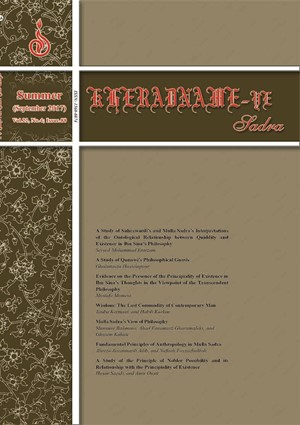-
-
List of Articles
-
Open Access Article
1 - Foreword
Seyyed Mohammad Khamenei -
Open Access Article
2 - A Study of Suhrawardi’s and Mulla Sadra’s Interpretations of the Ontological Relationship between Quiddity and Existence in Ibn Sina’s Philosophy
-
Open Access Article
3 - A Study of Qunawi’s Philosophical Gnosis
Gholamreza Hosseinpour -
Open Access Article
4 - Evidence on the Presence of the Principiality of Existence in Ibn Sina’s Thoughts in the Viewpoint of the Transcendent Philosophy
Mostafa Momeni -
Open Access Article
5 - Wisdom; The Lost Commodity of Contemporary Man
Tuba Kermani Habib Karkon Karkon -
Open Access Article
6 - Mulla Sadra’s View of Philosophy
Mansure Rahmani Ahad Faramarz Gharamaleki Faramarz Gharamaleki -
Open Access Article
7 - Mulla Sadra’s View of Philosophy
Mansure Rahmani Ahad Faramarz Gharamaleki Faramarz Gharamaleki Ghasim Kakaie -
Open Access Article
8 - Mulla Sadra’s View of Philosophy
Mansure Rahmani Ahad Faramarz Gharamaleki Faramarz Gharamaleki Ghasim Kakaie -
Open Access Article
9 - انگارة ملاصدرا از فلسفه
Mansure Rahmani Ahad Faramarz Gharamaleki Faramarz Gharamaleki Ghasim Kakaie -
Open Access Article
10 - انگارة ملاصدرا از فلسفه
Mansure Rahmani Ahad Faramarz Gharamaleki Faramarz Gharamaleki Ghasim Kakaie -
Open Access Article
11 - انگارة ملاصدرا از فلسفه
Mansure Rahmani -
Open Access Article
12 - Mulla Sadra’s View of Philosophy
Mansure Rahmani Ahad Faramarz Gharamaleki Faramarz Gharamaleki Ghasim Kakaie -
Open Access Article
13 - Fundamental Principles of Anthropology in Mulla Sadra
-
Open Access Article
14 - A Study of the Principle of Nobler Possibility and its Relationship with the Principiality of Existence
Hasan Saeidi Amir Osati -
Open Access Article
15 - -
Seyyed Mohammad Khamenei
-
The rights to this website are owned by the Raimag Press Management System.
Copyright © 2017-2026







